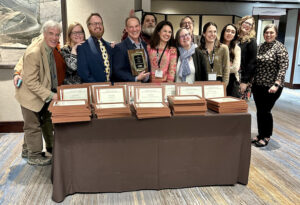
The New England Newspaper Convention, held on March 22-23, 2024, at the Westin Waltham Hotel in Waltham, Massachusetts, brought together journalists, photographers, designers, publishers, students, professors, vendors, and media advertising professionals. The event featured a variety of engaging sessions, including workshops, award presentations, and insightful talks by speakers and panelists.
While not every attendee went home from the Beter Newspaper Competition Awards banquet with one or more awards, some media organizations were seen carting off stacks of framed certificates presented across dozens of categories. Many who attended the full convention said they were rewarded with great insights from speakers, presenters, and panelists who led spirited, information-packed break-out sessions on each day.
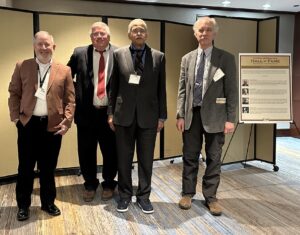
Friday evening, colleagues, staffers, and family members gathered to see George Brennan of The Martha’s Vineyard Times; David Brooks of the Concord Monitor; Melvin B. Miller of the Bay State Banner; and (posthumously) Frank Dingley of the Lewiston Evening Journal inducted into the New England Newspaper Hall of Fame.
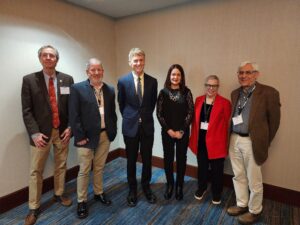
Other honorees shared the spotlight during Saturday’s Yankee Quill Award luncheon, as the New England Academy of Journalists honored George Brennan of The Martha’s Vineyard Times, Ellen Clegg of The Boston Globe, Izaskun “Sassy” E. Larraneta of The Day, Ed Miller of The Provincetown Independent, and Mark Pothier of The Boston Globe.
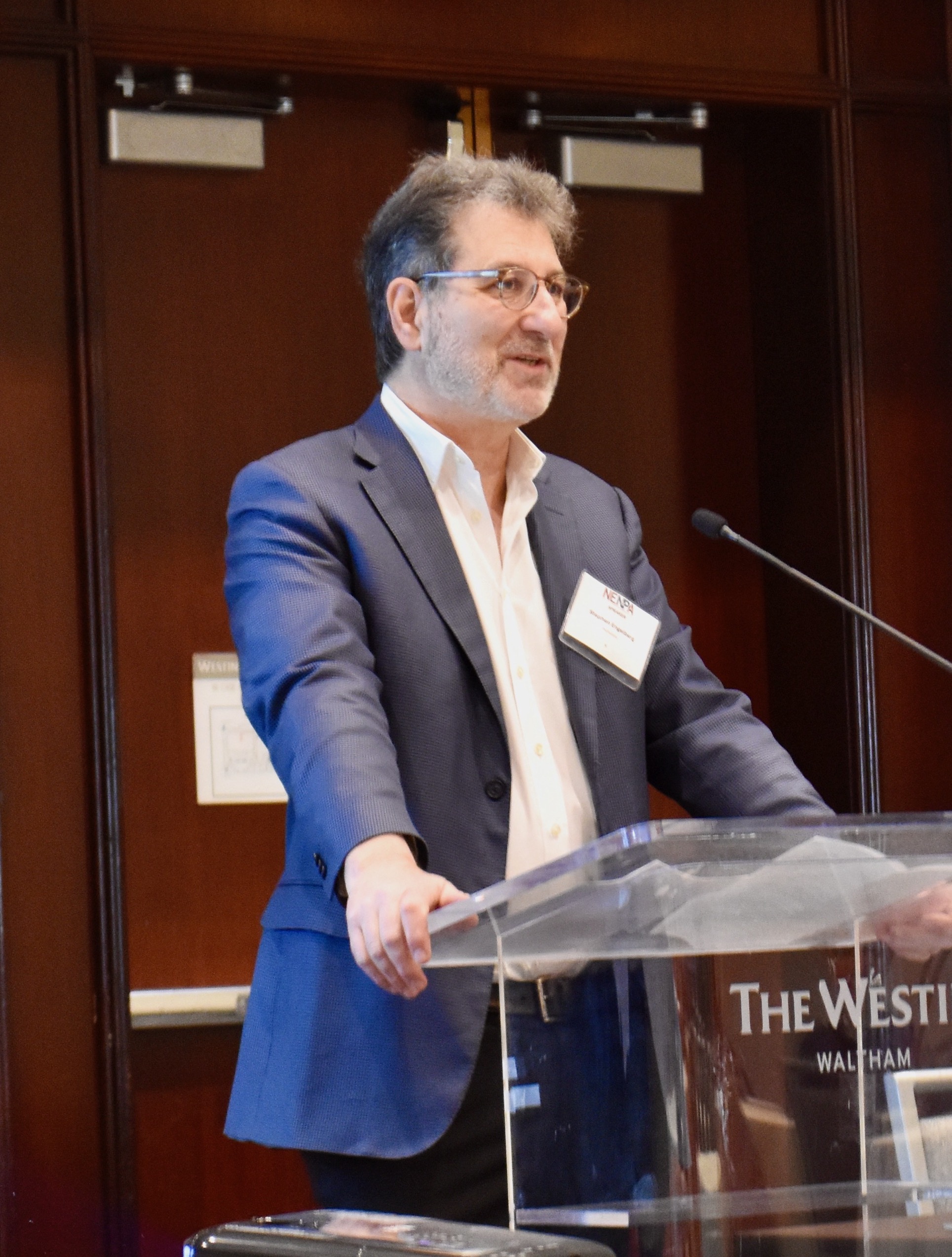
The keynote activities to kick off the convention, commenced Friday, March 22 at 11 am welcoming ProPublica Editor-in-Chief Stephen Engelberg to discuss “The Power of Collaboration.” He briefed attendees on how ProPublica has built a complex network of partners, collaborators, and colleagues at every level of the news media, from national newspapers to local television.
Engelberg stressed how developing each of these relationships began with thorough communications including agreeing upon how each involved party would be credited, how editing between or among co-publishers would be handled, and how potential crisis outcomes like lawsuits would be handled.
“We have institutionalized being everywhere with localized news networks,” he explained after he and his team determined “how we could become more deeply rooted” in areas of the country that might be lacking investigative resources, or those that have over time become news deserts.
When asked by departing NENPA Presiden Terry Williams of the Keene Sentinel about what that kind of collaboration looks like on the front lines, Engelberg said it often involved “putting reporters on the ground for weeks and months,” not hours and days.
“You have to believe wherever you are, that there are great stories that have to be told,” he added. And “you have to ask yourself, what’s happening in statehouses and local governments if somebody isn’t there” reporting it.
“There’s a whole bunch of (bad) things that never happened because we did our jobs,” Engelberg concluded, “your showing up matters. And in an era of shrinking resources, working with other people will get you what you need.”
Friday Breakout Sessions
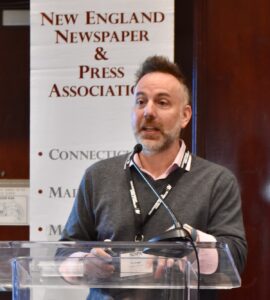
Following Friday’s lunch period, individual sessions were conducted beginning with back-to-back break-outs. Outgoing NENPA President Williams noted that NENPA and the New England Association of Communication Executives partnered in presenting “The Readership Imperative: Building Audience,” a two-part session that explored the ways and means to increase paid readership and retain audiences and membership.
“The opening session was led by Tim Griggs, founder of Blue Engine, a leading consultant working with publishers on increasing those who pay for content,” Williams said. “Following that, John Harrison, vice president of customer experience at Wallit, moderated a panel discussion on the tactics New England newspapers have taken to increase digital subscriptions.”
On the panel, in addition to Griggs, were Tim Dwyer, publisher of The Day in Connecticut; Allie Ginwala, audience engagement editor for the Concord (N.H.) Monitor; Jim Falzone, publisher for North of Boston Media Group; and Gary Lavariere, chief revenue officer for the Berkshire Eagle in Massachusetts, Williams added.
The first tier of sessions also brought in Bill Ostendorf from Creative Circle talking about “Writing headlines for readers.” And for those hoping to hone their Q&A skills, a spirited panel including Dugan Arnett of the Boston Globe; Jenifer McKim from GBH News Center for Investigative Reporting, and Emily Sweeney of the Boston Globe shared “Journalism Fundamentals: Interviewing techniques and sources.”
Among the many pearls of wisdom dispensed, McKim responded to one question urging young and upcoming journalists to “be confident and curious.” She also echoed Engelberg telling attendees, “relationship building is important.”
As Sweeny facilitated, she brought Dugan into the conversation. He detailed how he set about building a relationship with a local police chief over a period of many months, sharing tips and tactics that helped him produce a widely read report in the Globe.
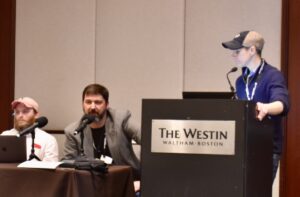
The next set of afternoon sessions introduced Jeff Potter of The Commons presenting “InDesign Tricks and Techniques for Newspaper Production.” At the same time, a panel featuring Ethan Genter of Vineyard Gazette, freelance journalist Rich Saltzberg, Justin Silverman from NEFAC, and the Globe’s Sweeney enlightening participants with “Journalism Fundamentals: Access to Public Records and FOIA Requests.”
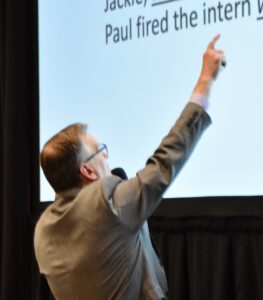
The final two break-outs of the day brought back Ostendorf talking about “Why branded content should be your premiere advertising offering this year.” Separately, Charles St. Amand from Suffolk University closed out the “Journalism Fundamentals” track helping participants improve their skills at being their own copy editors.
“There are a lot of words that are mis-used and confused,” St. Amand said, reminding engaged attendees, “Copy editors serve as gatekeepers guarding your publication’s reputation.”
Saturday Break-Outs
Early birds who were up for the opening sessions on March 23 were able to choose from three presentations.
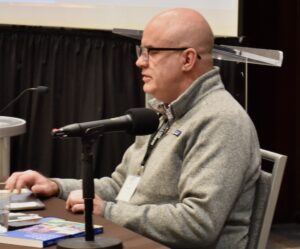
Mike Reilly, who created the JouralistsToolbox.ai, and is affiliated with the University of Illinois-Chicago presented the first of three sessions: “Introduction to AI Tools,” aiming to instruct journalists on how to harness the tools to save time, and introduce folks to MidJourney and Adobe Firefly to create photo illustrations; along with basic editing tools; writing prompts and updates to tools such as Google Gemini, ChatGPT, Claude, and others.
“A lot of folks are afraid of AI,” Reilly observed, but added that journalists could still benefit from the advanced technology as long as they “approach AI with cautious curiosity.”
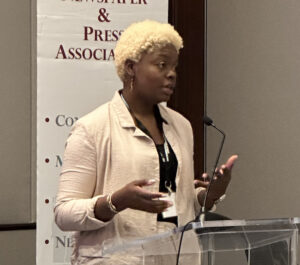
Consultant and educator Adriana Lacy from Brandeis University presented “Innovative Strategies for Monetizing Newsletters in 2024.” Separately, The Globe’s Tim Rasmussen focused on the rapidly evolving landscape of video journalism, focusing on crafting compelling narratives within the constraints of short-form content in his session: “Video: short-form storytelling for the newsroom.”
Reilly’s #2 session picked up continuing to educate attendees on “Data Journalism Fundamentals,” covering data scraping web pages with Google Sheets, and scraping PDFs with Tabula and PDFtoExcel.com, along with building graphics with Flourish.studio.
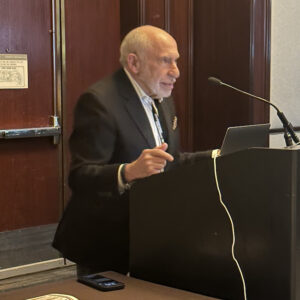
At the same time, NENPA introduced Boston Press Photographers Association member and independent photojournalist Angela Rowlings for a dive into the world of photojournalism and photo editing.
Afternoon sessions commenced with “three-peater” Reilly closing out his convention visit concentrating on “Fact-checking and the election,” where he revealed hands-on tools for fact-checking election-related content: Google reverse image search, Tineye, WatchFramebyFrame for videos, Fact-Check Explorer, and others.
A session entitled “Two Revolutions in the Newsroom: Mobile Storytelling and Artificial Intelligence” brought in Dr. Mario R. Garcia with case studies and discussion around the challenges facing editors transforming their news operations to become mobile-first operations, while also ushering in Artificial Intelligence.
And Saturday’s mid-afternoon panel delivered a master class on “Investigative Reporting,” with Noah Bombard from the MA Executive Office of Housing and Livable Communities; Antonia Noori Farzan of the The Providence Journal; Michael Gagne of The News-Times; Chris Larabee of the The Greenfield Recorder; Tiffany Tan from VTDigger; and Christopher Wheelock of the Sun Journal.
Saturday afternoon sessions wrapped with Yankee Quill honoree Clegg joining Northeastern University journalism professor Dan Kennedy discussing their recently released book, “What Works in Community News: Media Startups, News Deserts, and the Future of the Fourth Estate,” a groundbreaking study of the journalism startups that are solving the local news crisis one community at a time.
During Saturday’s lunch break, those who were not attending the Yankee Quill event were offered an opportunity to screen “Bad Press,” a timely documentary that premiered at Sundance in 2024. The documentary tells the true story of journalist Angel Ellis and the fight for press freedom in the Muscogee Native American Nation.
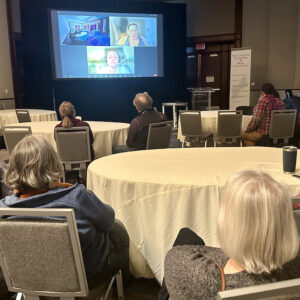
The screening was followed by a lively Q&A over Zoom, featuring Ellis, director at Mvskoke Media, and Becca Landsberry, executive director of the Native American Journalists Association.
The documentary opened with the shocking news that the Muscogee Nation, one of the few Native American tribes with a free press, had abruptly shut it down. The tribe’s government revoked the Free Press Act, giving them control over the news outlet, Mvskoke Media.
This act of censorship ignited a fire in Ellis, a tenacious reporter who refused to be silenced. She rallied a voter-supported amendment to the tribal constitution aiming to guarantee a free press forever. The film follows the high-stakes battle as the tribe approaches a new election, turning the fight for press freedom into a thrilling political race.
During the Q&A the presenters’ passion for the project and the fight for press freedom resonated with the audience, evidenced by the insightful questions posed. The powerful combination of the film and the live discussion suggested that “Bad Press “will play a significant role in supporting press freedom on other tribal reservations.
Journalists, newspaper professionals, and other members of the media are reminded to mark their calendars for the NENPA Fall Conference being presented in partnership with the New York Press Association, which is scheduled for September 20 – 21 in Providence, Rhode Island.
